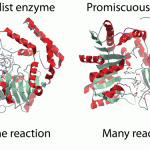
Meteorite ALH84001, aged 4.5 billion years, is one of 10 rocks from Mars that have been found to contain organic carbon compounds. Image: NASA/JSC/Stanford University
New research proves that Mars can produce organic carbon.
Finding molecules containing chains of carbon and hyrdogen has been an objective of past and present Mars missions. Carbon is a key ingredient for life on Earth and could tell scientists whether life has ever existed on Mars.
Carbon has appeared in Martian meteorites before, but there has always been a debate about it is the result of contamination from Earth or chemical/biological processes on the Red Planet. Researchers from the Carnegie Institution for Science in the US have examined 11 meteorites, spanning over 4.2 billion years of Mars’ history, and determined that the carbon they found originated on Mars.
The carbon is not of biological origin, but its presence suggests that complex carbon chemistry has taken place on Mars. It is reduced carbon, which has bonded to either other carbon molecules or to hydrogen, and has been stored on Mars throughout the planet’s history, according to lead researcher Andrew Steele.
“Understanding the genesis of these non-biological, carbon-containing macromolecules on Mars is crucial for developing future missions to detect evidence of life on our neighbouring planet.”
The reduced carbon compounds were found in 10 of meteorites, inside grains of crystallised minerals, and are believed to be the result of volcanic activity. The researchers were also able to show that at least some of the molecules came from Mars, rather than contamination from Earth, and that the planet has been doing organic chemistry for most of its life.
These findings, which were published in Science Express, should help scientists distinguish between non-biological carbon and potential life forms. Although this study has not yielded evidence that Mars has ever supported life, it does address some important questions about the sources of organic carbon on the planet, according to Mary Voytek, director of NASA’s Astrobiology Program.
“With the Curiosity rover scheduled to land in August, these new research results may help Mars Science Laboratory scientists fine-tune their investigations on the surface of the planet by understanding where organic carbon may be found and how it is preserved.”
Check out our new issue for more information about the Red Planet and whether humans could establish colonies there.
Source: NASA







Stephen Wilson
August 13, 2012
There’s life on Mars now, thanks to Curiosity: Youtube video: NASA Failed to Prevent Earth Life Contamination of Mars